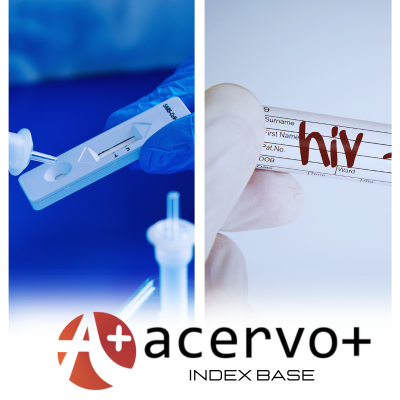Teste antígeno criptocócico de fluxo lateral na terapia preemptiva de pessoas que vivem com HIV em locais de alta prevalência da antigenemia criptocócica
##plugins.themes.bootstrap3.article.main##
Resumo
Objetivo: Determinar a prevalência da antigenemia criptocócica através do teste CrAg-LFA em pessoas que vivem com HIV (PVHIV) e que estão em tratamento com antirretrovirais, correlacionando com a detecção do Cryptococcus spp. no líquido cefalorraquidiano (LCR). Métodos: O estudo foi realizado de abril/2021 a julho/2021 em uma amostra de 250 PVHIV, em atendimento no ambulatório de referência em HIV/AIDS do Hospital Universitário Gaffrée e Guinle (RJ). Avaliamos a prevalência das infecções e correlação das faixas de linfócitos T CD4+ com a ocorrência de neurocriptococose, cujo diagnóstico era definido por cultura microbiológica a partir do LCR ou por exame micológico direto. A análise estatística consistiu do teste Kappa de Cohen com classificação de Landis & Koch (1977). Para tanto, utilizamos o programa SPSS 27 for Mac IBM. Resultados: Detectamos a prevalência da antigenemia criptocócica em 8,8% dos pacientes (IC 95% 5,5-13,3%). A concordância entre a antigenemia criptocócica e a neurocriptococose demonstrou-se robusta (0,875; p=0,0001). Conclusão: A prevalência de antigenemia na população de estudo e a concordância na detecção do antígeno criptocócico, no soro e LCR, indicam a necessidade da realização do CrAg-LFA no soro, nas PVHIV, independente da carga viral ou vigência de TARV.
##plugins.themes.bootstrap3.article.details##
Copyright © | Todos os direitos reservados.
A revista detém os direitos autorais exclusivos de publicação deste artigo nos termos da lei 9610/98.
Reprodução parcial
É livre o uso de partes do texto, figuras e questionário do artigo, sendo obrigatória a citação dos autores e revista.
Reprodução total
É expressamente proibida, devendo ser autorizada pela revista.
Referências
2. BRASIL. Ministério da Saúde. Protocolo Clínico e Diretrizes Terapêuticas para Manejo da Infecção pelo HIV em Adultos. Brasília: Ministério da Saúde, 2018. Disponível em:
3. COELHO C, et al. The Tools for Virulence of Cryptococcus neoformans. Advances in Applied Microbiology, 2014; 1(1): 1-41.
4. DERBIE A, et al. Cryptococcal antigenemia and its predictors among HIV infected patients in resource limited settings: a systematic review. BMC Infect Dis, 2020; 20(1): 407.
5. DRAIN PK, et al. Validation of clinic-based cryptococcal antigen lateral flow assay screening in HIV-infected adults in South Africa. Scientific Reports, 2019; 9(1): 2687.
6. FERREIRA MF, et al. Cryptococcal antigenemia prevalence and clinical data in HIV-infected patients from the reference centre at INI-FIOCRUZ, Rio de Janeiro, Southeast of Brazil. Mycoses, 2020; 63(2): 145-150.
7. FRENCH N, et al. Cryptococcal infection in a cohort of HIV-1 infected Ugandan adults. AIDS, 16(7): 1031-1038.
8. FROLA C, et al. Prevalência de infecção criptocócica entre pacientes com HIV avançado na Argentina usando imunoensaio de fluxo lateral. PLoS ONE, 2017; 12(6): 0178721.
9. HUANG C, et al. Emerging Cryptococcus gattii species complex infections in Guangxi, southern China. PLoS Negl Trop Dis, 2020; 14(8): 0008493.
10. HURTADO GS e QUINTERO-CUSGUEN P. Criptococosis meníngea. Acta Neurol Colomb, 2021; 37(1): 90-100.
11. JARVIS JN, et al. Cryptococcal antigen screening and preemptive therapy in patients initiating antiretroviral therapy in resource-limited settings: a proposed algorithm for clinical implementation. J Int Assoc Physicians AIDS Care, 2012; 11: 374-379.
12. JARVIS JN, et al. Screening for cryptococcal antigenemia in patients accessing an antiretroviral treatment program in South Africa. Clinical Infectious Diseases: An Official Publication of the Infectious Diseases Society of America, 2009; 48(7): 856-862.
13. KON AS, et al. Consenso em criptococose - 2008. Revista da Sociedade Brasileira de Medicina Tropical, 2008; 41(5): 524-544.
14. MAKADZANGE AT, et al. Early versus delayed initiation of antiretroviral therapy for concurrent HIV infection and cryptococcal meningitis in sub-saharan Africa. Clin Infect Dis Off Publ Infect Dis Soc Am, 2010; 50(11): 1532-1538.
15. OGOUYÈMI-HOUNTO A, et al. Prevalence and factors associated with cryptococcal antigenemia in HIV-infected patients in Cotonou/Benin. Journal de Mycologie Medicale, 2016; 26(4): 391-397.
16. OYELLA J, et al. Prevalência e fatores associados à antigenemia criptocócica entre adultos gravemente imunossuprimidos infectados pelo HIV em Uganda: um estudo transversal. Journal of the International AIDS Society, 2012; 15(1): 15.
17. PARK BJ, et al. Estimation of the current global burden of cryptococcal meningitis among persons living with HIV/AIDS. AIDS, 2009; 23(4): 525-530.
18. PONGSAI P, et al. The role of serum cryptococcal antigen screening for the early diagnosis of cryptococcosis in HIV-infected patients with different ranges of CD4 cell counts. The Journal of Infection, 2010; 60(6): 474–477.
19. POWDERLY WG, et al. Medição do antígeno criptocócico no soro e líquido cefalorraquidiano: valor no tratamento da meningite criptocócica associada à AIDS. Clin Infect Dis, 1994; 18: 789-792.
20. RAJASINGHAM R, et al. Integrando a triagem do antígeno criptocócico e o tratamento preventivo aos cuidados de rotina para o HIV. Jornal de Síndromes de Imunodeficiência Adquirida, 2012; 59(5): 85-91.
21. SÁEZ D, et al. Síndrome de restauración inmune asociado a tratamiento antirretroviral y criptococosis meníngea. Caso clínico. Revista Médica de Chile, 2006; 134: 10.
22. TAN I, et al. HIV-associated opportunistic infections of the CNS. Lancet Neurol, 2012; 11(7): 605-617.
23. UNAIDS BRASIL. Estatísticas. Disponível em:
24. VIDAL JE e BOULWARE DR. Lateral flow assay for cryptococcal antigen: an important advance to improve the continuum of hiv care and reduce cryptococcal meningitis-related mortality. Rev Inst Med Trop São Paulo, 2015; 57(19): 38-45.

